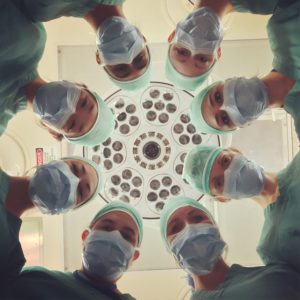 Our current health care system is based on allopathic medicine which refers broadly to medical practice. Also termed Western medicine, evidence-based medicine, or science-based, modern medicine. When we look at the root meaning of allopathy, we can see that:
Our current health care system is based on allopathic medicine which refers broadly to medical practice. Also termed Western medicine, evidence-based medicine, or science-based, modern medicine. When we look at the root meaning of allopathy, we can see that:
Allo – pathy
allo; opposing or against
pathy; sickness or suffering
From its inception, allopathic medicine has focused on counteracting the effects of sickness. It is sickness based. If you have a temperature the medical approach is to lower the temperature. If you have inflammation the medical approach is to lower the inflammation.
The system is not focused on asking why the individual has a temperature or inflammation in the first place.
If we did ask these types of critical questions, we would move much closer to addressing the root cause of the illness and have far-reaching health results.
It’s a “this for that” process. If you have reflux, take an antacid. If you have back pain, take anti-inflammatories. If you have a headache, take paracetamol. If you have asthma, take Ventolin. If you have a urinary tract infection, take antibiotics. The problem with this approach is that it assumes that the body makes mistakes. That the body gets things wrong. It assumes that things happen in a random manner rather than an ordered one. It would have us believe that disease results from either bad germs, bad genes, or bad luck.
This way of thinking is referred to as mechanistic. While there are some medical doctors who look more broadly at an isolated health complaint, most do not. Modern medicine since its commencement has taken a mechanistic approach to normalize health. The body is viewed as a collection of parts that act in predetermined ways and the body can only cope in a limited number of ways or situations.
The goal of this type of care is not to return a person to abundant health and help them stay there, but rather to alleviate their sickness and to lessen its unpleasant effects. In short, you have to be sick to enter the system and then they’ll treat your sickness. Which begs the question: Is this actually health care or is it sick care?
 Allopathy also sees the body as a collection of bits that can be broken down into smaller bits, which act in isolation. Therefore, any of the “bits” which don’t seem to be toeing the line can simply be replaced or removed. Some bits are even considered unnecessary like the tonsils, adenoids, or the appendix. This paradigm is reductionistic and doesn’t consider the synergistic effects that body parts have on one another. Here’s the thing – when you disrupt an ecosystem, the load is always taken up somewhere else and most people do not know how to support a body that’s taxed.
Allopathy also sees the body as a collection of bits that can be broken down into smaller bits, which act in isolation. Therefore, any of the “bits” which don’t seem to be toeing the line can simply be replaced or removed. Some bits are even considered unnecessary like the tonsils, adenoids, or the appendix. This paradigm is reductionistic and doesn’t consider the synergistic effects that body parts have on one another. Here’s the thing – when you disrupt an ecosystem, the load is always taken up somewhere else and most people do not know how to support a body that’s taxed.
Considering that the CDC ranks medical error as the third most common cause of death in the US it’s incredibly important that we raise the questions about our current health care system. Medical error has been defined as an unintended act (either of omission or commission), or one that does not achieve its intended outcome, the failure of a planned action to be completed as intended (an error of execution), the use of a wrong plan to achieve an aim (an error of planning), or a deviation from the process of care that may or may not cause harm to the patient. Patient harm from medical error can occur at the individual or system level.
 Hear me on this – there’s always a time and place for emergency care. If we have a traumatic accident of some kind, then the care and expertise of doctors and nurses are critical to our recovery. Likewise, if you’re having a heart attack, then a hospital is where you need to be. Part of our recovery however needs to ascertain and address what led to the heartache as there is always a reason for any sign or symptom in the body, be that a heart attack or a headache. The advice we receive in our recovery and return to good health, is paramount.
Hear me on this – there’s always a time and place for emergency care. If we have a traumatic accident of some kind, then the care and expertise of doctors and nurses are critical to our recovery. Likewise, if you’re having a heart attack, then a hospital is where you need to be. Part of our recovery however needs to ascertain and address what led to the heartache as there is always a reason for any sign or symptom in the body, be that a heart attack or a headache. The advice we receive in our recovery and return to good health, is paramount.
Let me share an example with you. My own mother had a heart attack 3 years ago and when the nurse was going through the homecare advice prior to leaving the hospital, she handed my mother 3 large, well-bound workbooks. She starting outlining her medication, appropriate exercise, and dietary advice explaining to my mother that she needed to eat low fat and low salt foods. Now as you know studying nutrition and nutritional research, are a continued passion of mine, and when I questioned these recommendations the nurse looked at me and said, “You know, you’re right. We are starting to learn that full fat is a better approach to take with cardiovascular health but none of our literature has been updated as yet, so we still give patients these booklets.” There was an awkward silence after she finished but she nodded and smiled at me as I took the books from her.
Our current health care system is functioning in isolation, it is flawed and it is geared to create a perpetual cycle of illness because:
a) These skilled practitioners are trained in emergency care or the management of health, they are not trained in wellness and vitalism.
b) If we have to be sick or have symptoms to have medical attention, we ignore the fact that many of the first signs of certain diseases don’t appear until to the end stages of the disease.
Sure, preventative models and screening tests such as having a pap smear to check for cell dysplasia in the cervix are highly beneficial to the patient with abnormal test results. However, if that individual receives no education on how to modify their lifestyle after her surgical procedure, has she learned how to prevent cancer from returning again or how to improve her health?
An ideal health care system would truly and fully embrace the knowledge of holistically trained health care practitioners, as well as medically trained practitioners.
Wellness practitioners understand that every part of the body is there for a reason and has important interactions with other parts of the body – that the body is an ecosystem. Looking at what is needed for health and what obstructs health. This is called holism. The termed ‘Holism’ was first coined by Jan Christiaan Smuts in 1926. These health professions acknowledge that there is an inner intelligence within the body. We see this when the immune system raises its temperature to fight off an infection. We see this when our body heals a wound.
Wellness is the study of health. A holistic or wellness-oriented health practitioner may be a medical doctor, but there are many other health care professionals from a variety of walks of life that fall into this category including doctors of chiropractic, Chinese medicine practitioners, naturopaths, homeopaths etc.
Defining these terms such as allopathy and wellness, and distinguishing the difference in approaches to health may sound like semantics until we clarify one point – an absence of sickness does not equal health. Health is much more than not being sick. This is one of the main failings of the allopathic approach. It believes that you can just remove a disease, or its effects, then you have restored health – but this is not so. It is this limitation of the current health care (or sick care) system, that health consumers need to appreciate. If you wanted to run a marathon successfully you wouldn’t seek out a coach who’s spent their life coaching sprinters.
 Here’s another example, if you visit your doctor today symptom-free for a health check-up, irrespective of your good health typically they will encourage you to have the flu vaccine. Rather than asking, how can we continue to build your immunity naturally so that if you encounter the flu this season, you will do so with greater resilience and strength. This is where modern medicine is deeply conflicted as it is now truly intertwined, even intermarried with Big Pharma. The networks of billionaires have seized the main levers of power and bent modern medicine to their own objectives. Let’s not fool ourselves the latest promotion of the COVID vaccine is no different from the playbook we have seen for all other pills and potions.
Here’s another example, if you visit your doctor today symptom-free for a health check-up, irrespective of your good health typically they will encourage you to have the flu vaccine. Rather than asking, how can we continue to build your immunity naturally so that if you encounter the flu this season, you will do so with greater resilience and strength. This is where modern medicine is deeply conflicted as it is now truly intertwined, even intermarried with Big Pharma. The networks of billionaires have seized the main levers of power and bent modern medicine to their own objectives. Let’s not fool ourselves the latest promotion of the COVID vaccine is no different from the playbook we have seen for all other pills and potions.
Holistic approaches to good health focus on empowering the individual to invest in oneself. To look deeper than presenting symptoms and address what’s out of balance within the body and their environment. This means that all aspects of your body are considered, including feelings; behaviour, stress, diet, nutrition, and environment. A wellness approach advises people on lifestyle modification, which removes the interference and restores the required nutrients for health. There are no nasty side-effects of reducing emotional stress or toxins, equally so (when guided appropriately); eating better, and exercising consistently.
 Surely our health care system is better served by governments embracing the skills of all of these health care practitioners. This way the public has access to safe and effective natural medicine, and emergency medicine.
Surely our health care system is better served by governments embracing the skills of all of these health care practitioners. This way the public has access to safe and effective natural medicine, and emergency medicine.
“Of course, this is logical” you may say. “Don’t governments do this already?” No, medical doctors are still placed as the gatekeepers for our health care system.
Look no further than the censorship we see today on doctors and health practitioners being unable to share their clinical experience or speak about natural approaches to managing COVID. When they spoke up holistic health care practitioners were threatened or had their licenses removed. This was certainly my experience.
There are countless examples of how our current health care system is not geared to help individuals weigh up all the different approaches they may take to strengthen their health. Due to Big pharma’s monopoly, our current system is geared to keep one reliant on drugs from crib to grave.
Your best option is to establish a health framework for your family. This is something I’ve spoken a lot about over the years. Here you seek out inspiring holistic medical doctors and health practitioners alike, whom you can turn to for sound advice, not only in times of emergency but more importantly along your journey to greater health and wellbeing. Practitioners who inspire you with each conversation and interaction. This what true health care involves.
Yours in Health,
Dr. Jennifer Barham-Floreani
Award-winning health practitioner and best selling author.
Bach. Chiropractic, Bach. App Clinical Science
Registered internationally, no longer practicing as a chiropractor in Australia.
References:
Makary, M, Daniel, M, & Kohls, GG (3 May 2016). Medical error—the third leading cause of death in the US. BMJ2016;353:i2139doi: 10.1136/bmj.i2139. Department of Surgery, Johns Hopkins University School of Medicine, Baltimore, MD 21287, USA



